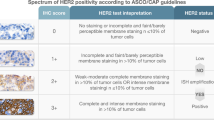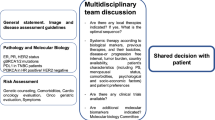Abstract
Purpose
A subset of patients with intermediate 21-gene signature assay recurrence score may benefit from adjuvant chemoendocrine therapy, but a predictive strategy is needed to identify such patients. The 95-gene signature assay was tested to stratify patients with intermediate RS into high (95GC-H) and low (95GC-L) groups that were associated with invasive recurrence risk.
Methods
Patients with ER-positive, HER2-negative, node-negative breast cancer and RS 11–25 who underwent definitive surgery and adjuvant endocrine therapy without any cytotoxic agents were included. RNA was extracted from archived formalin-fixed, paraffin-embedded samples, and 95-gene signature was calculated.
Results
206 patients had RS of 11–25 (95GC-L, N = 163; 95GC-H, N = 43). In Cox proportional hazards model, 95GC-H was significantly associated with shorter time to recurrence than was 95GC-L (HR 5.94; 95%CI 1.81–19.53; P = 0.005). The correlation between 95-gene signature and 21-gene signature assay scores was not strong (correlation coefficient r = 0.27), which might suggest that 95-gene signature reflects biological characteristics differing from what 21-gene signature shows.
Conclusions
The 95-gene signature stratifies patients with ER-positive, HER2-negative, node-negative invasive breast cancer and intermediate RS of 11–25 into high and low groups that are associated with recurrence risk of invasive disease. Further retrospective analysis in the prospectively accrued TAILORx population is warranted to confirm that 95-gene signature can identify patients who would benefit from adjuvant chemoendocrine therapy.


Similar content being viewed by others
References
Paik S, Shak S, Tang G, Kim C, Baker J, Cronin M, Baehner FL, Walker MG, Watson D, Park T, Hiller W, Fisher ER, Wickerham DL, Bryant J, Wolmark N (2004) A multigene assay to predict recurrence of tamoxifen-treated, node-negative breast cancer. N Engl J Med 351(27):2817–2826. https://doi.org/10.1056/NEJMoa041588
Harris L, Fritsche H, Mennel R, Norton L, Ravdin P, Taube S, Somerfield MR, Hayes DF, Bast RC Jr. (2007) American Society of Clinical Oncology 2007 update of recommendations for the use of tumor markers in breast cancer. J Clin Oncol Off J Am Soc Clin Oncol 25(33):5287–5312. https://doi.org/10.1200/jco.2007.14.2364
National Comprehensive Cancer Network (NCCN) Clinical practice guidelines in oncology: breast cancer. V2.2015. Available at http://www.nccn.org/professionals/physician_gls/f_guidelines.asp
Aebi S, Davidson T, Gruber G, Castiglione M (2010) Primary breast cancer: ESMO Clinical Practice Guidelines for diagnosis, treatment and follow-up. Ann Oncol Off J Eur Soc Med Oncol/ESMO 21(Suppl 5):v9-14. https://doi.org/10.1093/annonc/mdq159
Sparano JA, Gray RJ, Makower DF, Pritchard KI, Albain KS, Hayes DF, Geyer CE, Dees EC, Perez EA, Olson JA, Zujewski J, Lively T, Badve SS, Saphner TJ, Wagner LI, Whelan TJ, Ellis MJ, Paik S, Wood WC, Ravdin P, Keane MM, Gomez Moreno HL, Reddy PS, Goggins TF, Mayer IA, Brufsky AM, Toppmeyer DL, Kaklamani VG, Atkins JN, Berenberg JL, Sledge GW (2015) Prospective validation of a 21-gene expression assay in breast cancer. N Engl J Med 373(21):2005–2014. https://doi.org/10.1056/NEJMoa1510764
Sparano JA, Gray RJ, Makower DF, Pritchard KI, Albain KS, Hayes DF, Geyer CE, Dees EC, Goetz MP, Olson JA, Lively T, Badve SS, Saphner TJ, Wagner LI, Whelan TJ, Ellis MJ, Paik S, Wood WC, Ravdin PM, Keane MM, Gomez Moreno HL, Reddy PS, Goggins TF, Mayer IA, Brufsky AM, Toppmeyer DL, Kaklamani VG, Berenberg JL, Abrams J, Sledge GW (2018) Adjuvant chemotherapy guided by a 21-gene expression assay in breast cancer. N Engl J Med 379(2):111–121. https://doi.org/10.1056/NEJMoa1804710
Sparano JA, Gray RJ, Ravdin PM, Makower DF, Pritchard KI, Albain KS, Hayes DF, Geyer CE, Dees EC, Goetz MP, Olson JA, Lively T, Badve SS, Saphner TJ, Wagner LI, Whelan TJ, Ellis MJ, Paik S, Wood WC, Keane MM, Gomez Moreno HL, Reddy PS, Goggins TF, Mayer IA, Brufsky AM, Toppmeyer DL, Kaklamani VG, Berenberg JL, Abrams J, Sledge GW (2019) Clinical and genomic risk to guide the use of adjuvant therapy for breast cancer. N Engl J Med 380(25):2395–2405. https://doi.org/10.1056/NEJMoa1904819
Naoi Y, Kishi K, Tanei T, Tsunashima R, Tominaga N, Baba Y, Kim SJ, Taguchi T, Tamaki Y, Noguchi S (2011) Development of 95-gene classifier as a powerful predictor of recurrences in node-negative and ER-positive breast cancer patients. Breast Cancer Res Treat 128(3):633–641. https://doi.org/10.1007/s10549-010-1145-z
Shiino S, Kinoshita T, Aogi K, Ohsumi S, Takahashi M, Ito K-I, Oba T, Arihiro K, Shiroma N, Tsukamoto F, Yoshida M (2017) 185PThe first report of multicenter validation study of 95-gene classifier, a multi-gene prognostic assay of estrogen receptor positive and node negative breast cancer patients. Ann Oncol 28(Suppl_5):v56. https://doi.org/10.1093/annonc/mdx362.035
Gyorffy B, Benke Z, Lanczky A, Balazs B, Szallasi Z, Timar J, Schafer R (2012) RecurrenceOnline: an online analysis tool to determine breast cancer recurrence and hormone receptor status using microarray data. Breast Cancer Res Treat 132(3):1025–1034. https://doi.org/10.1007/s10549-011-1676-y
Naoi Y, Kishi K, Tsunashima R, Shimazu K, Shimomura A, Maruyama N, Shimoda M, Kagara N, Baba Y, Kim SJ, Noguchi S (2013) Comparison of efficacy of 95-gene and 21-gene classifier (Oncotype DX) for prediction of recurrence in ER-positive and node-negative breast cancer patients. Breast Cancer Res Treat 140(2):299–306. https://doi.org/10.1007/s10549-013-2640-9
Wolff AC, Hammond ME, Hicks DG, Dowsett M, McShane LM, Allison KH, Allred DC, Bartlett JM, Bilous M, Fitzgibbons P, Hanna W, Jenkins RB, Mangu PB, Paik S, Perez EA, Press MF, Spears PA, Vance GH, Viale G, Hayes DF, American Society of Clinical O, College of American P (2013) Recommendations for human epidermal growth factor receptor 2 testing in breast cancer. J Clin Oncol Off J Am Soc Clin Oncol 31(31):3997–4013
Tsunashima R, Naoi Y, Kishi K, Baba Y, Shimomura A, Maruyama N, Nakayama T, Shimazu K, Kim SJ, Tamaki Y, Noguchi S (2012) Estrogen receptor positive breast cancer identified by 95-gene classifier as at high risk for relapse shows better response to neoadjuvant chemotherapy. Cancer Lett 324(1):42–47. https://doi.org/10.1016/j.canlet.2012.04.017
Sparano JA, Crager MR, Tang G, Gray RJ, Stemmer SM, Shak S (2021) Development and validation of a tool integrating the 21-gene recurrence score and clinical-pathological features to individualize prognosis and prediction of chemotherapy benefit in early breast cancer. J Clin Oncol 39(6):557–564. https://doi.org/10.1200/jco.20.03007
Kalinsky K, Barlow WE, Meric-Bernstam F, Gralow JR, Albain KS, Hayes D, Lin N, Perez EA, Goldstein LJ, Chia S, Dhesy-Thind S, Rastogi P, Alba E, Delaloge S, Martín M, Gil MG, Arce-Salinas C, Brain E, Park IH, Pierga J-Y, Lluch AH, Vasquez MR, Borrego MR, Jung KH, Ferrero J-M, Schott A, Shak S, Sharma P, Lew DL, Miao J, Tripathy D, Hortobagyi G, Pusztai L (2021) Abstract GS3-00: First results from a phase III randomized clinical trial of standard adjuvant endocrine therapy (ET) +/- chemotherapy (CT) in patients (pts) with 1-3 positive nodes, hormone receptor-positive (HR+) and HER2-negative (HER2-) breast cancer (BC) with recurrence score (RS) < 25: SWOG S1007 (RxPonder). Cancer Res. https://doi.org/10.1158/1538-7445.Sabcs20-gs3-00
Acknowledgements
Editorial assistance was provided by Sunita Patterson and Donald R Norwood of Scientific Publication Services, Research Medical Library, The University of Texas MD Anderson Cancer Center. We also thank Kirk Y. Hirata and Christine Nakamoto of Pathology, The Queen’s Medical Center for collection archival tissue samples.
Funding
This work was supported by the Morgan Welch Inflammatory Breast Cancer Research Program; a Grant from the State of Texas Rare and Aggressive Breast Cancer Research Program; the MD Anderson’s Cancer Center Support Grant from the National Cancer Institute (CA016672).
Author information
Authors and Affiliations
Corresponding author
Ethics declarations
Conflict of interest
K.Y., T.M., and S.T. are employees of Sysmex Corporation (Curebest™ 95GC Breast service provider). Y.N. holds a joint patent on Curebest™ 95GC Breast with Sysmex Corporation, receive research funds from Sysmex and AstraZeneca, and received a lecture fee of 100,000 yen a year from Sysmex Corporation, AstraZeneca and Takeda. S.N. has received honoraria and research grants from Sysmex Corporation and has been an advisor for Sysmex Corporation and holds a joint patent on Curebest™ 95GC Breast with Sysmex. N.T.U. has research grants with Sysmex Corporation and with Genomic Health.
Ethical approval
This retrospective chart review with linked tissue analysis was approved by the central Institutional Review Boards at the five participating institutions in the USA and Japan: The University of Texas MD Anderson Cancer Center (protocol number: PA15-0905), University of Hawai’i Cancer Center (protocol number: RA-2017-021), Medical College of Wisconsin (protocol number: PRO00029366), Anne Arundel Medical Center (protocol number: 1056834), and Showa University (protocol number: 2383). A waiver of informed consent was granted based on the study’s retrospective nature.
Informed consent
For this type of study, formal consent is not required.
Additional information
Publisher's Note
Springer Nature remains neutral with regard to jurisdictional claims in published maps and institutional affiliations.
Supplementary Information
Below is the link to the electronic supplementary material.
Rights and permissions
About this article
Cite this article
Fujii, T., Masuda, H., Cheng, Y.C. et al. A 95-gene signature stratifies recurrence risk of invasive disease in ER-positive, HER2-negative, node-negative breast cancer with intermediate 21-gene signature recurrence scores. Breast Cancer Res Treat 189, 455–461 (2021). https://doi.org/10.1007/s10549-021-06276-7
Received:
Accepted:
Published:
Issue Date:
DOI: https://doi.org/10.1007/s10549-021-06276-7




